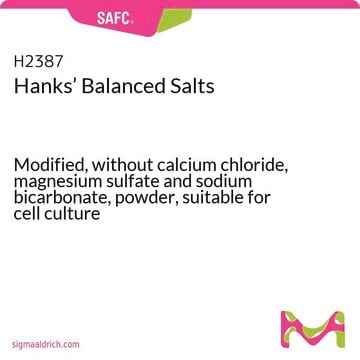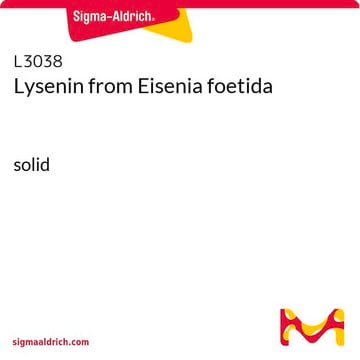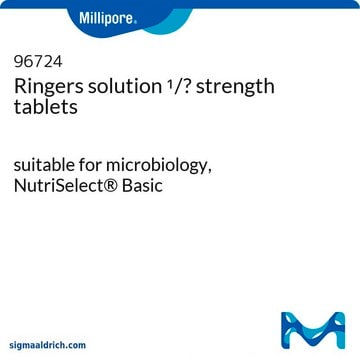H4385
Hanks′ Balanced Salt solution
10 ×, Modified, without calcium, magnesium or sodium bicarbonate
Synonym(s):
HBSS
Sign Into View Organizational & Contract Pricing
All Photos(1)
About This Item
UNSPSC Code:
12352107
NACRES:
NA.47
Recommended Products
Looking for similar products? Visit Product Comparison Guide
General description
Hanks′ Balanced Salt solution (HBSS) is a cell and tissue culture solution. It is widely recommended for cell maintenance and conservation of tissues for a longer period. In addition, HBSS is used as a wet storage media for avulsed teeth, as it has the ideal osmolality and physiological pH for preserving the vitality of cells.
Application
Hanks′ Balanced Salt solution (HBSS) has been used for the elimination of the epithelial layer from the leukocytes and lymphocytes from the colon cells. It has also been used for the isolation of quail spermatozoa
Packaging
Contains: NaCl, 80 g/L; KCl, 4 g/L; glucose, 10 g/L; KH2PO4 600 mg/L; Na2HPO4 475 mg/L and phenol red, 170 mg/L
Other Notes
pH 6.9 when diluted according to instructions. Osmolality 240-250 mOsm/Kg.
Storage Class Code
12 - Non Combustible Liquids
WGK
WGK 2
Flash Point(F)
Not applicable
Flash Point(C)
Not applicable
Certificates of Analysis (COA)
Search for Certificates of Analysis (COA) by entering the products Lot/Batch Number. Lot and Batch Numbers can be found on a product’s label following the words ‘Lot’ or ‘Batch’.
Already Own This Product?
Find documentation for the products that you have recently purchased in the Document Library.
Customers Also Viewed
Shusei Mizushima et al.
Methods in molecular biology (Clifton, N.J.), 1650, 243-257 (2017-08-16)
A characteristic biological property of avian gamete (e.g., extremely large egg and polyspermic fertilization) does not allow the direct observation of sperm-egg interactions in vitro, but recent research advances make it possible to manipulate the gamete in vitro. Here, we
Wilson Roberto Poi et al.
Brazilian dental journal, 24(5), 437-445 (2014-01-30)
Dental avulsion is the most severe type of traumatic tooth injuries because it causes damage to several structures and results in the complete displacement of the tooth from its socket in the alveolar bone. The ideal situation is to replant
Athina-Myrto Chioni et al.
Methods in molecular biology (Clifton, N.J.), 1487, 255-267 (2016-12-08)
Organotypic models are 3D in vitro representations of an in vivo environment. Their complexity can range from an epidermal replica to the establishment of a cancer microenvironment. These models have been used for many years, in an attempt to mimic
Xiu-Li Kuang et al.
BMC neuroscience, 11, 137-137 (2010-10-26)
Neuron-derived neurotrophic factor (NDNF) is evolutionarily well conserved, being present in invertebrate animals such as the nematode, Caenorhabditis elegans, as well as in the fruit fly, Drosophila melanogaster. Multiple cysteines are conserved between species and secondary structure prediction shows that
Györgyi Műzes et al.
Comparative immunology, microbiology and infectious diseases, 52, 48-57 (2017-07-05)
The influence of cell-free DNA (fDNA) administration on the TLR9-autophagy regulatory crosstalk within inflammatory circumstances remains unclear. To examine the immunobiologic effects of iv. fDNA injection on the TLR9-mediated autophagy response in murine DSS-colitis. Different types of modified fDNAs were
Our team of scientists has experience in all areas of research including Life Science, Material Science, Chemical Synthesis, Chromatography, Analytical and many others.
Contact Technical Service








